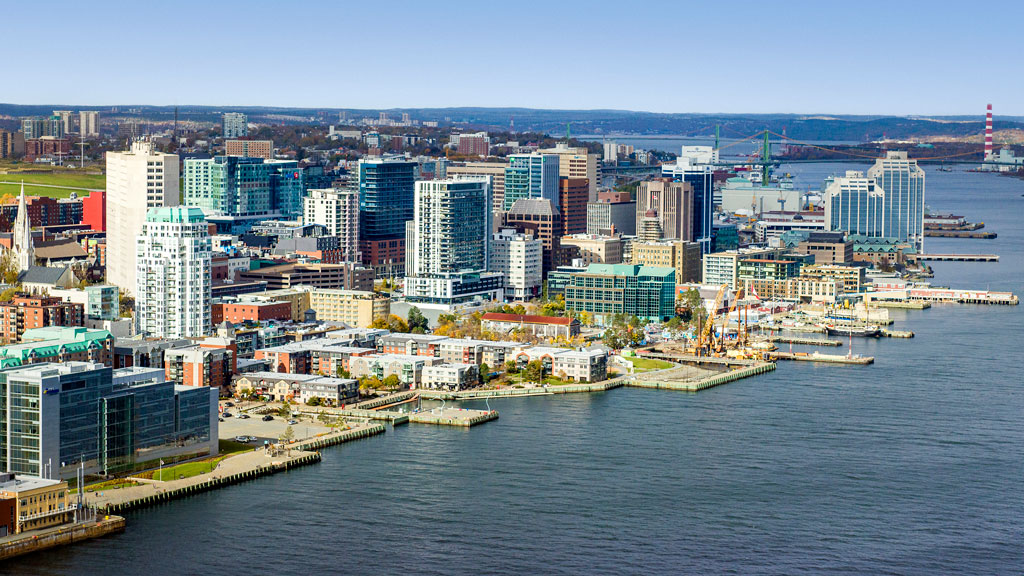Numerous construction cranes are swinging over Halifax as the city’s hot construction pace continues despite the impact of the pandemic.
Duncan Williams, president of the Construction Association of Nova Scotia, says residential construction, sometimes with retail and even office components, is a major driver for the city’s current boom.
While COVID-19’s impact on the economy is apparent, the construction industry has not sustained a major blow.
Development of multi-residential rentals is “going great guns” and the city is seeing record or near-record starts in all new housing, points out Ian Munro, chief economist with the Halifax Partnership, a non-profit public/private partnership comprised of business advisers, economists and others working with the Halifax Regional Municipality on the city’s economic growth plan.
Munro says new public works projects are in the ground as well, a hospital, for example. Only the city’s office sector is slow, largely because of high vacancy rates after several years of busy development.
The economist says the Halifax Index, an annual economic review of stats and figures tabled by the Halifax Partnership, shows construction has continued throughout COVID-19 while other industries have slowed or paused.
In some ways the pandemic may have helped spark Halifax’s latest residential development. The city’s population is growing with the increase coming from out-of-province and even overseas.
“For the most part you can work from anywhere in the world now,” Williams says.
“A lot more people want to work and play close to home (because of the pandemic) and they are concerned about their environmental footprint.”
The city’s affordability and recreational lifestyle are draws but so is the growth of such sectors as information technology and life sciences, Munro points out.
He attributes record population growth since 2017-18 in part to initiatives by the city and other stakeholders to draw people from outside the province, especially new immigrants.
Francis Fares, president of Halifax-based developer Fares & Co. Development Inc., says while construction margins are good, labour shortages are a problem, not because of the pandemic but rather the brisk construction pace.
“We cannot get trades. They won’t even price your job. Everyone we talk to says it will be a year or 18 months,” says Fares, whose company has started excavation for a 27-storey residential apartment tower and is constructing several lowrise multi-family rental projects including in the downtown waterfront.
“We’re reaching out to New Brunswick to find trades, but it is booming there too.”
Foreseeing more delays in construction scheduling in the city, Fares attributes the rental construction boom largely to rising rental rates.
“It is almost the same pricing as Toronto.”
Apart from being hit by a Canadian or global economic crisis, Fares doesn’t see an impediment to construction activity over the next few years.
Len Bryden, director of training with the Carpenter Millwright College Mainland Nova Scotia, says training apprenticeship carpenters and trades in general in the building industry is in high demand in Halifax and he doesn’t seen a slowdown coming.
He says training has remained steady throughout the pandemic but at limited numbers and cohort sizes. “Many COVID-19 protocols have been in place and followed, including physical distancing, mask use and online training.”
Still, Bryden says most class training has continued to be conducted in person.
While Williams has heard reports of as many as 50 tower cranes on the Halifax skyline, he says there could be more activity if there were fewer development hurdles in the city’s planning and permitting process.
“We have probably got in excess of a thousand condominiums, apartments and multi-unit residential projects in the pipeline but we just can’t seem to get them through (permitting) fast enough.”
He says there is about an 80 to 100 day delay in the permit approval stage for “fairly straightforward projects.”
The city has recently hired more staff to expedite permitting and, Munro says, the Halifax Partnership is working with the city on the next five-year economic strategy which includes increasing needed affordable housing.











As an almost 5 year resident of Nova scotia, it is awesome to see the growth in the province, especially metro Halifax. The Dartmouth side could really use some inspiring architecture – promptly approving the Magna owner proposed 3 tower would be a great start. It would define the waterfront for a generation and launch Halifax into one of Canada’s most attractive cities!